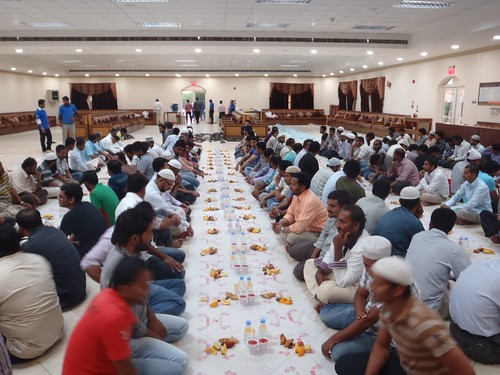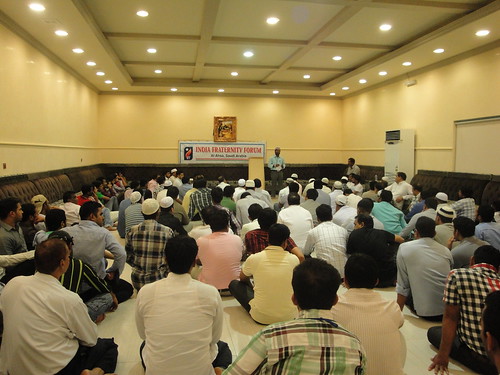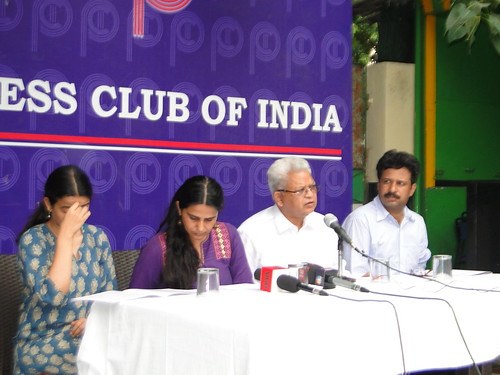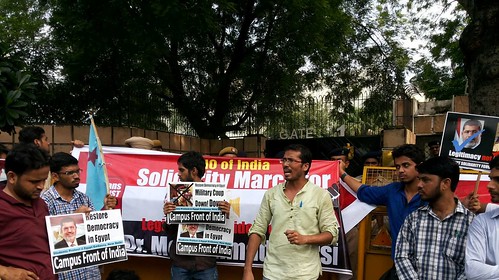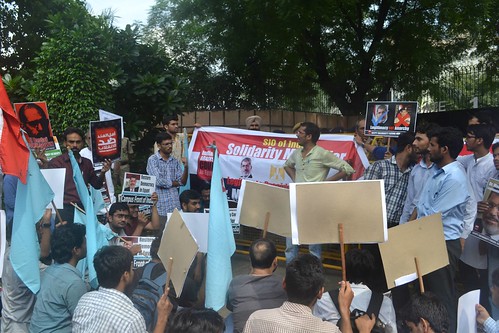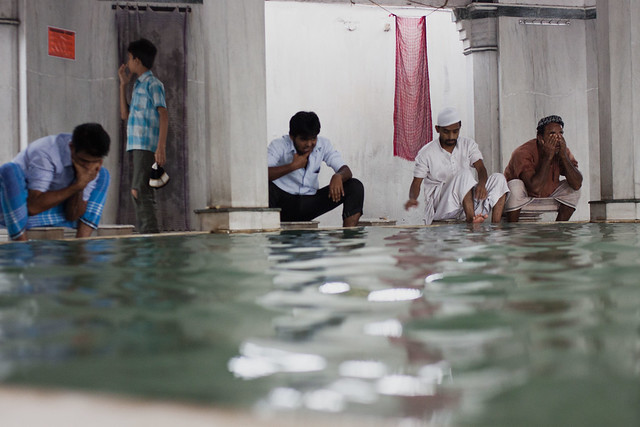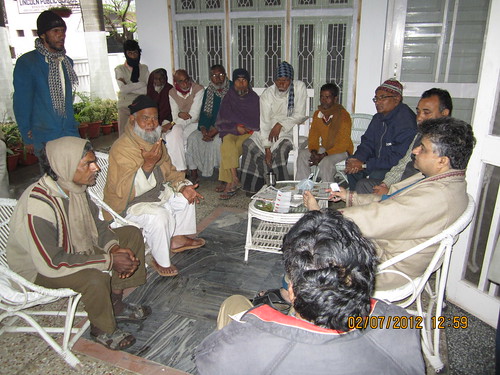By Irfan Engineer
I: Contours of Communal Vs. Pseudo Secularism
The BJP is once again attempting to redefine secularism in order to attractively package its Hindu nationalist politics. The politics of Hindu nationalism bases itself on stigmatizing minorities, particularly the Muslim and the Christian community. The two communities are demonized in order to alarm the gullible members of majority community who fall for the propaganda regarding non-existing danger. The anxious and alarmed gullible members are then easy to mobilize for building an authoritarian, repressive and culture enforcing state which privileges the economic and social elite. The typical Hindu nationalist charge against the two communities is that Christians convert large numbers of Hindus using fraud, coercion and inducements (even though the population of Christians has fallen from 2.6% in 1971 to 2.3% in 2001); that all terrorists are Muslims (disregarding confessions of “Swami” Aseemanand and terror related accusation against “Sadhvi” Pragya Singh Thakur and others); that loyalty of Muslims is suspect and they are more loyal to the neighbouring Pakistan and ISI uses them to destabilize India and mount terrorist attacks; that they nurture separatist goals; that they practice polygamy leading to rapidly growing population; that they infiltrate illegally from neighbouring countries – Pakistan and Bangladesh; that Muslim rulers demolished Hindu temples in order to destroy Hindu religion etc.
Demonization of the minorities provides justification for arming the state with unaccountable power through non-transparent security apparatus, which are then conducive to rapid growth of crony capitalism at the cost of marginalized under-class like the workers, peasants, landless, dalits, adivasis, women and other backward classes. The intruding security apparatus intimidates the under-classes. The alarmed under-class, anxious about the “security of the state”, unwittingly surrenders the gains of democracy and democratic institution that would otherwise afford them space to collectively advance their interests. Hindu Nationalism also aims to persuade the members of majority community, particularly the under-class, to leave the feudal caste based hierarchies intact in the name of glorious ancient Hindu traditions. For Hindu nationalists, retaining the feudal traditions and hierarchical caste based structures in the name of traditions and constructing a strong authoritarian state which holds the minority communities down is “positive secularism”. Congress’ secularism comes under sharp attack from the BJP as “pseudo-secularism” on the ground that it is nothing else but “minority appeasement”. By levelling the charge of “minority appeasement” the BJP really means that Congress is not as stridently anti-minority as itself.
The track record of Congress in treating the Muslim and Christian minorities too is nothing to go the town about. Over 40,000 people killed in communal riots, an overwhelming majority of which are members of religious minorities with the guilty having no fear of being brought to justice. The communal riots under Congress government include – Jabalpur in 1961, Ahmedabad in 1969 and 1984, Bhiwandi in 1970 and 1984, Nellie in 1983, anti-Sikh riot in 1984, Bhagalpur in 1989, Moradabad, Godhra in 1981, Meerut in 1987 etc. Staged fake encounter targeting Sikhs in Punjab and Muslim youth in Batla House (Delhi), Mumbai, Hyderabad and other towns provide media opportunity to tarnish the minorities as terrorists and run stories demonizing the minority communities and increase their TRPS and circulation and coming up with anti-democratic legislations like AFSPA, UAPA, TADA and POTA giving virtually unaccountable powers in the hands of security agencies in the name of counter terrorism measures. Minorities are discriminated in providing infrastructure like roads, schools, access to drinking water and health facilities. Minorities are also discriminated in structures of opportunities, including education, public employment, bank loans, government contracts, etc., now well documented by Sachar Committee Report. Lack of proper security environment, discrimination in bank loans, government contracts and opportunities and poor infrastructure facilities have resulted in educational, social and economic backwardness among the minorities. Even a section of BJP has acknowledged after the Sachar Committee Report that Muslims have been in fact discriminated.
However, Congress attracts charge of “minority appeasement” by the BJP when it takes remedial steps which are too little too late and virtually ineffective to address social and educational backwardness among the minorities. BJP accuses Congress of minority appeasement also on another count – viz. when it frames legislations that are partly accommodative towards minority culture as regards affording them family law based on their faith. However, Congress has more than accommodated the upper caste elite, a tiny minority within the politically constructed majority community, by enforcing their cultural norms on the rest in matters of family laws, anti-cow slaughter legislations, anti-conversion laws that are prone to be misuse by its implementers against the minorities. VHP cadres have formed regular teams to extort money in collusion with some police officers regularly from members of minorities involved in transportation or trade of animals even when they are doing nothing illegal. The extortion amounts are ever increasing and have put the minorities out of business making space for others.
Congress governments have also been more than accommodative towards culture and religious beliefs of the upper caste elite and enforcing it on the rest with legal interventions for example, on the issue of Babri Masjid issue. It acquired the land on which Babri Masjid stood, and allowed the Masjid to be demolished! This later facilitated the Allahabad High Court to divide the land into three “equal” parts and distribute it among the “litigants” – two-third of it going to Hindu litigants and the original owner getting only one third and that too on the margins. Had the land not been acquired and had the mosque not been demolished, such a verdict would have been unthinkable. To conclude the above discussion, while the Hindu nationalists wants to obliterate all cultural uniqueness of diverse non-upper caste elite, perhaps with the exception of ways of worship, and leave political space only for upper-caste culture, the Congress would be a little bit space for culture of minorities and a bit more accommodative as its political strategy. It is this conflict that is reflected in the accusations of pseudo secularism (read minority appeasement) by the BJP and charge of “communal party” by the Congress.
II: India First
Narendra Modi, who is positioning himself as a national leader and prime ministerial candidate of the BJP for 2014 general election has now come up with a new definition of secularism – “India First”. All he is reported to have said by way of “definition” is, “nothing less than India’s wellbeing should be our goal and if this happens, secularism will automatically run in our blood” That leaves a lot to imagination and begs further questions – India’s well being is in what? In allowing corporate India to prosper by grabbing the common resources of the nation at dirt cheap rate, leading to a jobless and futureless “growth” at the cost of the poorest in India, increasing the GDP and India’s rating with “Standard & Poor”? Is it in liberalization, privatization and globalization attracting more and more risky and volatile global capital? Or is it in ensuring more equitable and sustainable development benefitting most to the poorest and improving their quality of life as a priority? While Modi does not answer these questions, but his priorities are well known to devote space here. Modi’s “India First” definitely appears to be a slogan calculated to say, “not the poorest first, not the discriminated first, not the backward regions first, not the socially backward first, not the victims of development first and not the weakest sections first”. For, if these sections are to be given priority and treated first, India, its GDP, will not be first! Standard and Poor will not be proclaiming “India is first”, India will not be the first destination for global super profit pursuing capital.
BJP’s “Positive Secularism”:
While there is debate on what constitutes secularism, and different countries adopt its own version, any standard textbook on secularism would educate us that the least that is required of a secular state is that the state distances itself from religious institutions, religious texts, religious education and expenses by state on religion. However, performance of BJP governments when it was in power was in the centre and in the states where it is in power is contrary to all understandings of secularism. While in Centre, Murli Manohar Joshi was the HRD Minister proposed teaching of Courses in Vedic Astrology, karmakand, yogic consciousness etc. as a subject for Higher education. The universities in India would be producing Hindu priests! If you teach Vedas, you are positive secularist, and if you teach Qur’an and Bible, one is pseudo secularist. Madhya Pradesh Government introduced teaching Gita in school and forcing schools receiving government grant-in-aid to teach yoga and perform surya namaskar, sing saraswati vandana to children belonging to all religious communities. BJP Govt. in Madhya Pradesh started sponsoring senior citizens travel to pilgrimage within India and the pilgrimage sites are the one which Hindus visit. Therefore a Muslim senior citizen would not join the pilgrimage! If Haj Pilgrims are being “subsidized”, it amounts to minority appeasement, while if citizens are sponsored for pilgrimage to various holy sites in India, it is positive secularism! We condemn subsidy to Haj Pilgrims as well as any expenditure on religious belief of any citizen.
BJP has been demanding anti-conversion laws that seek state regulation of conversions from one religion to another. However, the Hindu nationalists have been forcibly converting Christians to Hinduism in Kandhamal district. Victims of anti-Christian violence in 2007-08 were forced to stay in relief camps and could not return to their villages and cultivate their land or rebuild their houses until they agreed to be converted to Hindu religion. Stringent conditions were forced on them – tonsuring their heads, levying heavy fines for following Christian religion in the past and promising to join mobs that attack Christians should the “village” decide to do so. While forcible conversion from any religion is termed by them as “ghar vapsi”, even voluntary conversions to Christianity and Islam is stigmatized as conversion by force or inducement and a campaign is mounted against every conversion from Hinduism to Christianity or Islam. Most conversions from Hinduism to Christianity or Islam is due to the fact that upper-caste Hindus exclude and oppress dalits, whereas the oppressed hope to be treated with dignity and equality in the religion they are seeking to convert to. There are other reasons as well for voluntary conversions which we do not want to into here. Under BJP rule, the Rajasthan Assembly passed a bill providing that conversion to religion of one’s forefathers (read Hindu religion) would not be considered as religious conversion! Under Modi’s supremacy, Gujarat Assembly passed a bill amending its anti-conversion law to provide that conversion from Sikhism, Buddhism, Jainism and Hinduism could continue unregulated, operating under the principle that Sikhism, Buddhism and Jainism were not separate religions, but sub-sects of Hinduism. The Gujarat Bill and Rajasthan Bill, both were not assented to by the Governor and were referred to the President of India. To force unwilling Christians to convert to Hinduism and to prevent the dalits from converting to Christianity or Islam is “India First” brand of secularism but to give the citizens freedom to follow religion of their choice is appeasement of minorities and following anti-national policies!
Anti-cow slaughter legislations in the country is becoming more draconian and an instrument of oppression of minorities in BJP ruled states. MP Govt. amended the legislation enhancing the punishment for cow laughter to 7 years imprisonment and shifting the burden of proof on the accused! Offences have been made non-bailable. Police have been authorised to enter kitchens if they suspect cooking or consumption of beef and seize vessels, equipments, storage (read refrigerator) etc. The law is indiscriminate and inhuman directed against minorities. It is being used to subjugate minorities. The anti-cow legislation have only one justification and one basis – religious practices of the Hindu upper-caste. Why should the state prescribe or regulate dietary preferences of citizens and enter their kitchens to enforce religion based ideology? Jains would similarly demand that state ban onions and garlic from consumption list of the citizens and Muslims would demand pork be banned! If the religion of Jains and Muslims is not being taken into account in proposing dietary prescription to citizens, why should that of upper caste Hindus be taken? Is it “India First” or upper castes first?
Moral policing
Hindu nationalists have vandalised M.F. Hussain’s paintings on the grounds that they offend religious sensibilities of the citizens. M.F.Hussain was hounded out of the country using a combination of violence and misusing judicial proceedings. They prevented the film “Water” being shot in Varanasi. Bal Thackeray forced producers to cut scenes that were against his and his party’s interests, even after the Censor Board approved it. Hindu nationalist have routinely imposed dress codes and opposed Valentine day, beaten up women in pubs, disrupted parties being organized by youngsters with boys and girls attending.
We could list many other measures, including the desire to impose upper caste family law on the entire nation in the name of uniform civil code and other things. For lack of space, we have to conclude here. India First is nothing else but Political Power First and imposition of patriarchal, feudal, hierarchical upper caste culture on the rest of Indians following rich and diverse cultural traditions, including egalitarian traditions. Diversity has taught the people to live in harmony and learn from various traditions through everyday interactions and further enrich themselves.
--
Irfan Engineer is associated with Centre for Study of Society and Secularism, Mumbai.
